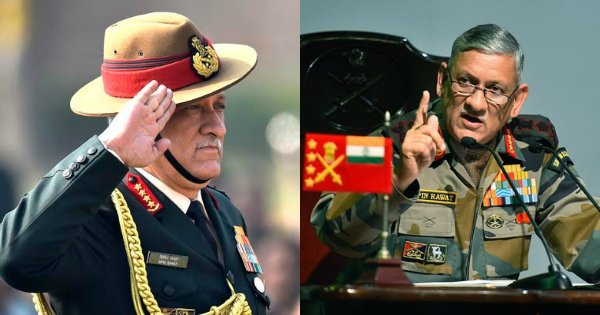Gen Bipin Rawat is the 27th Chief of the Army Staff of the Indian Army. He became the chief on 17 December 2016, by superseding two more senior Lieutenant Generals, Praveen Bakshi and P. M. Hariz. He is the fourth officer from the Gorkha Brigade to become the Chief of the Army Staff. Prior to his appointment as COAS, Gen Rawat assumed the post of GOC-C Southern Command on 1 January 2016 and the post of Vice Chief of Army Staff on 1 September 2016.
How To Prepare for SSB Interview:
Here are 8 things that all the defence aspirants can learn from the life and career of Gen Bipin Rawat:
-
Sword of Honour is a lifetime achievement:
Gen Rawat won the Sword of Honour when he graduated from the Indian Military Academy in 1978. Of all his course mates, this was his first achievement as a commissioned officer in the Indian army. This carries a long way in life and career.
-
Adaptability:
Gen Rawat hails from Pauri Garhwal in Uttarakhand, got commissioned in the Gorkha Rifles, commanded the Indian Brigade in UN peacekeeping mission in Congo and went on the command the Pune-based Southern Army Command. If this does not speak about his adaptability, just like many other officers, I don’t know what will.
-
Studies Never End:
Studying is an integral part of succeeding in life. There comes a point when the ladder of success runs out of stairs. It is when you need to make new stairs and that comes by education. Gen Rawat is a graduate of the Defence Services Staff College, Wellington and the Higher Command Course at Fort Leavenworth, USA. He has an MPhil in Defence Studies from Madras University, a Diploma in Management and another in Computer Studies. In 2011, he was awarded a Doctorate of Philosophy by Chaudhary Charan Singh University, Meerut for his research on military-media strategic studies. Studies are never-ending. Make your mind up for that and start working on it.
-
Your Father is your major inspiration:
Gen Bipin Rawat’s father Lt Gen Lakshman Singh Rawat retired as the Deputy Chief of Army Staff in 1988 and is his inspiration, Gen Bipin Rawat followed his father’s footsteps to rise to the highest rank in the army. This is perhaps for the first time that the son of the former Deputy Chief will go on to become the chief of the 1.3 million strong Indian Army.
-
Accidents are meant to learn from it and move on:
On 3 Feb 2015, Gen Bipin Rawat survived a helicopter crash when the single-engine helicopter he was flying crashed minutes after it took off from Dimapur, Nagaland. Unfortunately, while Gen Rawat was recovering from his accident, his father passed away just a week later on 11 Feb 2015.
Current Affairs eBooks
-
Don’t take it easy on terrorists:
In June 2015, 18 Indian soldiers were killed in an ambush by militants belonging to UNLFW in Manipur. The Indian Army responded with cross-border surgical strikes by 21 Para who struck an NSCN-K base in Myanmar. 21 Para was under the operational control of the Dimapur-based III Corps, which was then commanded by Gen Rawat.
-
Iron fist for the enemies of the world :
Gen Rawat commanded the Indian brigade during the UN peacekeeping operation in the Democratic Republic of the Congo in 2008. Indian peacekeepers performed splendidly under his leadership. The general is credited with providing dynamic leadership under the UN banner. The Indian peacekeepers switched their approach from a velvet glove to an iron fist under his leadership. He was twice awarded the Force Commander’s Commendation.
-
Be ready to take on new roles and challenges:
Gen Rawat commanded a spectrum of formations before becoming the chief. He commanded a company in Uri, an infantry battalion in the Eastern sector along the LAC, 5 Sector of Rashtriya Rifles (Sopore) as brigade commander, 19 Infantry Division (Uri), III Corps (Dimapur) and was General Officer Commanding-in-Chief (GOC-C) Southern Command (Pune). He also held staff assignments at the Indian Military Academy (Dehradun), General Staff Officer Grade 2 at the Military Operations Directorate, logistics staff officer of a Re-organised Army Plains Infantry Division (RAPID) in central India, Colonel Military Secretary and Deputy Military Secretary in the Military Secretary’s Branch and Senior Instructor in the Junior Command Wing. He also commanded MONUSCO for the UN Peacekeeping mission.
Conclusion:
No matter how much you achieve in life, there is always scope for new learnings in life and we must always keep on expanding our scope for improvement. This can not be taught better by anyone else except the life of Gen Bipin Rawat itself.
A living inspiration!
How To Prepare for SSB Interview:





